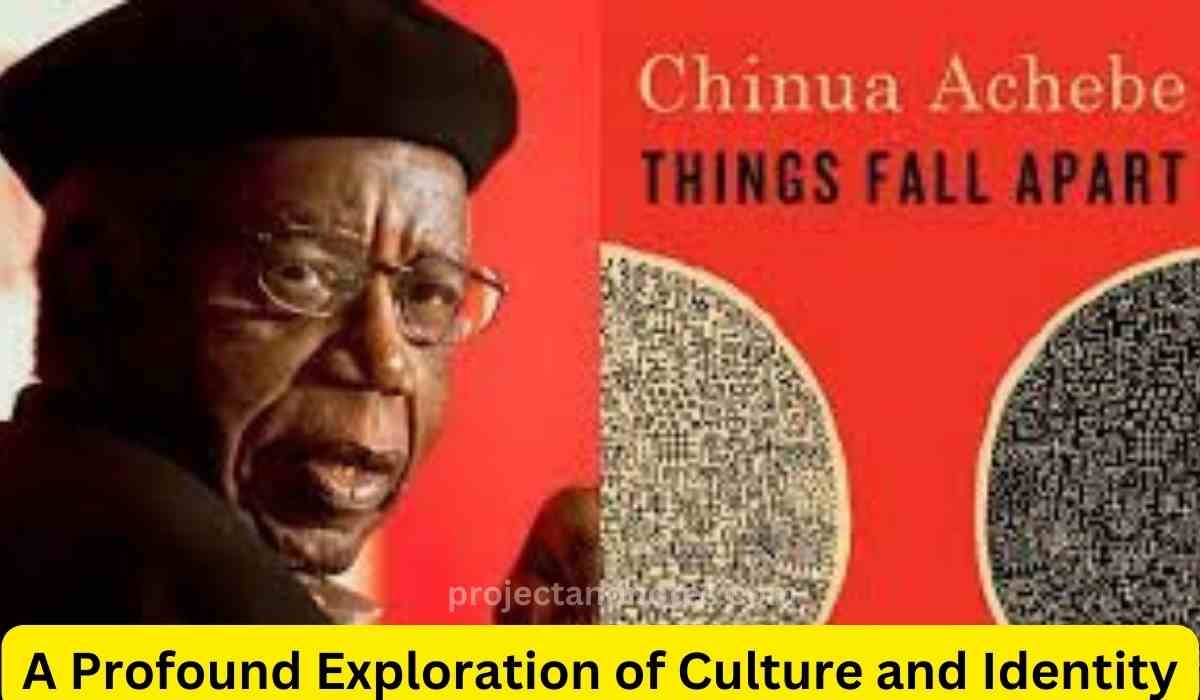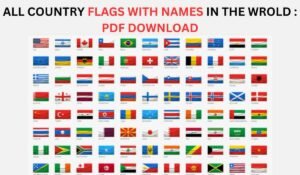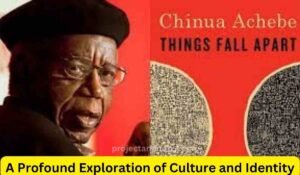HELLO FRIENDS,
I Shweta welcome all of you to this article, today through our website projectandnotes.com you are going to get complete information about Things Fall Apart: A Profound Exploration of Culture and Identity.
- 1 Table of Contents
- 2 1. Introduction: Unveiling the Essence of “Things Fall Apart”
- 3 2. The Cultural Landscape of Umuofia
- 4 3. The Complexity of Okonkwo’s Character
- 5 4. The Clash of Cultures: Traditional vs. Colonial
- 6 5. The Role of Women in “Things Fall Apart”
- 7 “Things Fall Apart” PDF
- 8 6. Spirituality and Ancestral Beliefs in Umuofia
- 9 7. Themes of Masculinity and Father-Son Relationships
- 10 8. The Impact of European Colonialism on Umuofia
- 11 9. Tragic Elements in “Things Fall Apart”
Table of Contents
- Introduction: Unveiling the Essence of “Things Fall Apart”
- The Cultural Landscape of Umuofia
- The Complexity of Okonkwo’s Character
- The Clash of Cultures: Traditional vs. Colonial
- “Things Fall Apart” PDF
- The Role of Women in “Things Fall Apart”
- Spirituality and Ancestral Beliefs in Umuofia
- Themes of Masculinity and Father-Son Relationships
- The Impact of European Colonialism on Umuofia
- Tragic Elements in “Things Fall Apart”
1. Introduction: Unveiling the Essence of “Things Fall Apart”
In the realm of African literature, Chinua Achebe’s magnum opus, “Things Fall Apart,” stands as a remarkable work that delves into the intricate tapestry of culture, tradition, and identity. Set in pre-colonial Nigeria, this iconic novel weaves a captivating narrative that offers profound insights into the complexities of societal transformation and the resilience of the human spirit. Through vivid storytelling and compelling characters, Achebe presents a thought-provoking exploration of the clash between indigenous African culture and the encroaching forces of European colonialism.

2. The Cultural Landscape of Umuofia
Umuofia, the Igbo village where the story unfolds, serves as the backdrop for Achebe’s narrative. The author skillfully paints a vivid picture of the customs, traditions, and social structures that shape the lives of its inhabitants. From the council of elders to the revered Oracle of the Hills and Caves, every facet of Umuofia’s cultural fabric is meticulously depicted. Achebe’s attention to detail enables readers to immerse themselves in the rich tapestry of Igbo life, gaining a deeper appreciation for the significance of cultural heritage.
3. The Complexity of Okonkwo’s Character
At the heart of “Things Fall Apart” is the enigmatic protagonist, Okonkwo. Achebe masterfully crafts Okonkwo as a multifaceted character, embodying both admirable qualities and tragic flaws. Driven by a relentless desire to distance himself from his father’s perceived weakness, Okonkwo epitomizes the pursuit of masculinity, power, and success. However, his deep-seated fear of failure and vulnerability ultimately lead to his downfall. Okonkwo’s internal struggle serves as a poignant reflection of the broader tensions between tradition and change.
4. The Clash of Cultures: Traditional vs. Colonial
One of the central themes in “Things Fall Apart” is the collision of African tradition with the intrusion of Western colonialism. Achebe vividly portrays the arrival of the white missionaries and their subsequent influence on the indigenous people of Umuofia. This clash of cultures disrupts the delicate balance that existed within the village, leading to profound societal changes and a rupture in the fabric of traditional life. Through this narrative, Achebe highlights the detrimental effects of imperialism on indigenous cultures and the struggle to preserve identity amidst external pressures.
5. The Role of Women in “Things Fall Apart”
While the novel primarily focuses on the male-dominated society of Umuofia, Achebe also sheds light on the pivotal role of women in Igbo culture. Through characters like Okonkwo’s wives, Ezinma, and the priestess Chielo, Achebe challenges stereotypical representations of African women and showcases their resilience, wisdom, and agency. By giving voice to these female characters, Achebe offers a nuanced perspective on gender dynamics within traditional African societies.
“Things Fall Apart” PDF
6. Spirituality and Ancestral Beliefs in Umuofia
Spirituality and ancestral beliefs play a significant role in the lives of the characters in “Things Fall Apart.” Achebe portrays the deep reverence for the gods and the ancestors, highlighting the intricate rituals, sacrifices, and divination practices that shape the spiritual landscape of Umuofia. Through these elements, Achebe captures the essence of Igbo cosmology and emphasizes the profound connection between the people and their ancestral heritage.
7. Themes of Masculinity and Father-Son Relationships
“Things Fall Apart” explores complex themes surrounding masculinity and the dynamics of father-son relationships in Igbo society. Okonkwo’s constant pursuit of manliness and his strained relationship with his own father exemplify the societal expectations and pressures placed upon men. Achebe skillfully navigates these themes, delving into the complexities of tradition, patriarchy, and the impact they have on familial bonds.
8. The Impact of European Colonialism on Umuofia
The arrival of European colonial powers in Umuofia marks a pivotal turning point in the narrative. Achebe depicts the detrimental effects of colonization on the community, including the erosion of cultural values, the disruption of social structures, and the loss of autonomy. By exposing the exploitative nature of colonialism, Achebe highlights the far-reaching consequences of imperial domination and the resistance it evokes among the indigenous population.

9. Tragic Elements in “Things Fall Apart”
“Things Fall Apart” bears the hallmarks of a tragic narrative. As the story unfolds, Okonkwo’s journey becomes one of tragic proportions, characterized by his fatal flaws and the inexorable forces of change. Achebe’s storytelling prowess allows readers to empathize with the protagonist’s struggles and witness the tragic consequences that befall him and his community. This tragic dimension adds depth and poignancy to the novel, leaving a lasting impression on its readers.
READ MORE :- The Diary of a Wimpy Kid Pdf : A Hilarious Journey Through Adolescence







